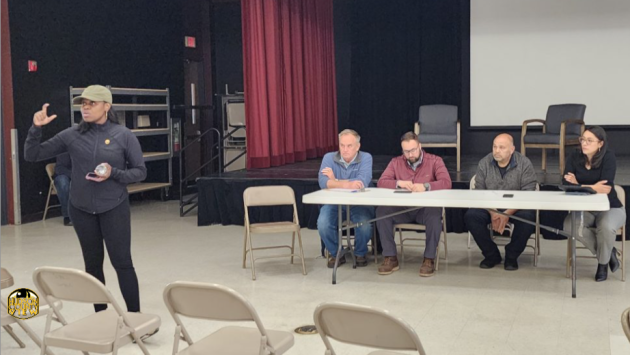Jersey City Ward Councilwoman Denise Riley hosted a community meeting last night regarding ongoing municipal utilities authority (MUA) repairs and potential upcoming marathon run issues on Garfield Avenue.
By Daniel Ulloa/Hudson County View
“I attended their [MUA] board meetings, and they agreed to do a community meeting. This has been a huge inconvenience. It feels like every couple months … the street is open, ” Ridley explained.
Jersey City MUA Chief Engineer Richard Haytas explained that under Garfield Avenue is a large drainage area that receives sewage from several blocks, which hurricanes damaged in 2021.
“The city was tasked to fix that,” he noted.
They used a robot to inspect the pipes and the MUA realized that the system’s infrastructure was severely decaying and threatening to collapse under Garfield Avenue. He added that the lined replacements were made possible due to federal grants,
“Where we’re replacing is where we had multiple water main breaks,” he said, noting that pipes were more than 100 years old and gas main leaks were a separate but related issue.
Haytas admitted that the process has been noisy and inconvenient since jackhammering is needed to break big rocks and replace existing pipes with larger ones.
A woman spoke out and said she hasn’t gotten much sleep since the project started in January, to which he replied that there are a lot of moving parts.
After being pressed further, Haytas said the goal is to complete the construction by July and that work will hopefully not be 24/7 come early May.
“We did not know the gas main was in bad shape, it escalated into replacing all the utilities,” he continued.
Another attendee complained that running errands and even having company over is extremely difficult now due to the condition of the street and the constant noise.
“When we do it in stages, it adds a lot more time and a lot more money. I’ve been with the city for 27 years. We never did more work than in the last 5 years,” Haytas replied.
He also indicated that work at night is preferred in case homes are temporarily left without water.
The Jersey City marathon, which also impacts Garfield Avenue, was then discussed and the crowd on hand largely opposed it coming through their neighborhood.
Jersey City Marathon Director and Planning Board Commissioner Steve Lipski said the race was first held last year and boasted 6,000 contestants.
This year, he said there would be 7,900 people, many from out of state and some even from outside the country.
“This route allowed two people … to qualify for the United States Olympics team,” Lipski asserted..
“That’s nice, but we’re not interested in that,” a woman responded.
Ridley noted that her constituents were prefer not to have the race cut through Garfield Avenue.
“We hired professional people to do this,” Lipski said about the race design, noting that it is too late to change the design with the event less than a month away (scheduled for Sunday, April 14th).
“It is an inconvenience for people living here. What do you project you’ll raise? How much of that will be kept in this area?” Jersey City Cannabis Control Board Commissioner Jeff Kaplowitz said from the audience.
As complaints continued, Lipski said he previously spoke at a community event organized by Ward F Councilman Frank “Educational” Gilmore, who was also there last night, that public schools would accomodate parking, and that the event last for less than one day.
He also was forthcoming in that he was unsure of how the proceeds of the marathon would be spent..
“You guys did Pacific [Avenue], and we had the same issue. At some point, these are professionals and they should forecast problems. We can’t keep having the same issue,” Gilmore said.
Cory Garriga, an aide to Hudson County Commissioner Bill O’Dea (D-2) noted Sip Avenue had similar problems that concerned residents.
“How are the residents going to be alerted?” he asked.
Haytas said their private contractor handles the work and some outreach.
“There’s a problem with communication … Otherwise it looks like there is no coordination,” political activist Elvin Dominici said.
Haytas said rocks and railroad ties are unexpected delays that makes planning difficult. He noted rain also delays projects.
Gilmore suggested the MUA should give 60 days notice to residents before a project is underway.
Haytas noted the sewer became an emergency that demanded attention.
“I need you to be more diligent in your communications. That’s all they’re really asking for,” Gilmore declared.
“Maybe we need a community meeting every month,” Haytas suggested.
“I’m inconvenienced too … The mayor is running the marathon but wasn’t aware of the paving. I just spoke to him,” Ridley added.
She also suggested that the MUA to put updates on the water bill, which Haytas said was possible.
“I know it’s a big inconvenience. Once we get done with this, there will be benefits for everyone,” he said.
“A lot of the times we don’t get the notifications on things. We’re not in those meetings. I try to communicate with you as much as possible,” Ridley said about the process.
Ridley reiterated she was able to organize a community meeting after attending MUA board meetings, encouraging others to do the same.
“They don’t want no one to show up … I need you to know these things,” she exclaimed.
Ridley said she wasn’t aware that they had to tear up the street and then do it again since it does not require city council consent.
“I did talk to the mayor about that. He didn’t realize that was happening, either. We’re going to have a meeting tomorrow,” she added.









